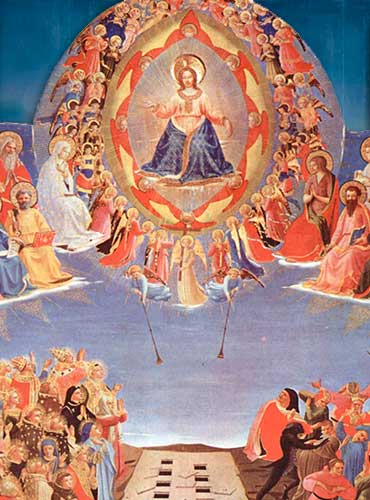Monday of the First Week of Lent – Option 2 – Mt 25:31-46
There’s a lot that could be said about today’s Gospel, but we can consider just two points: first, what Christ says about heaven and hell, and, secondly, the importance of the little things we do as Christians.
Regarding the first, we’re reminded that Christ “wills everyone to be saved and to come to knowledge of the truth” (1 Tm 2:4). Jesus tells those who have acted well to “inherit the kingdom prepared for [them] from the foundation of the world” (Mt 25:34). This is man’s ultimate goal, his happiness, and it has been prepared for him from all eternity. This is what God wants for us. Note the contrast in Christ’s description of hell: He tells the goats, “Depart from me, you accursed, into the eternal fire prepared for the devil and his angels” (Mt 25:41). The fire is for the devil and the demons, not for man. It’s as though Christ means to say: that fire wasn’t prepared for you, it wasn’t in my plan for you or what I wanted for you, but you merited it; you threw yourself in there by your refusal to serve others and, through them, Christ Himself.
The Gospel also reminds us of the need to serve others, our second point. The good people’s surprise at Christ’s words is genuine: they accounted what they had done as very little; it must’ve seemed like almost nothing to them. Yet, to Christ, it was a great thing, because it was done with love.
We can consider two examples from the lives of the saints: the story is well-known of Saint Martin of Tours. One cold winter day, as he was entering a city, a beggar stopped him and asked for alms. Martin had no money; but the beggar was blue and shivering with cold, and Martin gave what he had. He took off his soldier’s coat, worn and frayed as it was; he cut it in two and gave half of it to the beggar man. That night he had a dream. In it he saw the heavenly places and all the angels and Jesus in the midst of them; and Jesus was wearing half of a Roman soldier’s cloak. One of the angels said to him, “Master, why are you wearing that battered old cloak? Who gave it to you?” And Jesus answered softly, “My servant Martin gave it to me.”[1]
Likewise, in her Diary, Saint Faustina recounts how she once took care of a young man who came to her convent door. She writes: “This young man, emaciated, barefoot and bareheaded, and with his clothes in tatters, was frozen because the day was cold and rainy. He asked for something hot to eat. So I went to the kitchen, but found nothing there for the poor. But, after searching around for some time, I succeeded in finding some soup, which I reheated and into which I crumbled some bread, and I gave it to the poor young man, who ate it. As I was taking the bowl from him, he gave me to know that He was the Lord of heaven and earth. When I saw Him as He was, He vanished from my sight. When I went back in and reflected on what had happened at the gate, I heard these words in my soul: My daughter, the blessings of the poor who bless Me as they leave this gate have reached My ears. And your compassion, within the bounds of obedience, has pleased Me, and this is why I came down from My throne-to taste the fruits of your mercy (Diary, 1312).
As we heard in the first reading, God tells us that we must “love our neighbor as ourselves.” In the Lenten season, we can ask ourselves how well we are doing this, not just with the poor, but with all those around us, our coworkers, our families. Let us ask, through the intercession of Mary, Our Lady of Sorrows, for the grace to do even the smallest and most insignificant deeds with great love.
[1] Cited in Barclay’s Biblical Commentary






